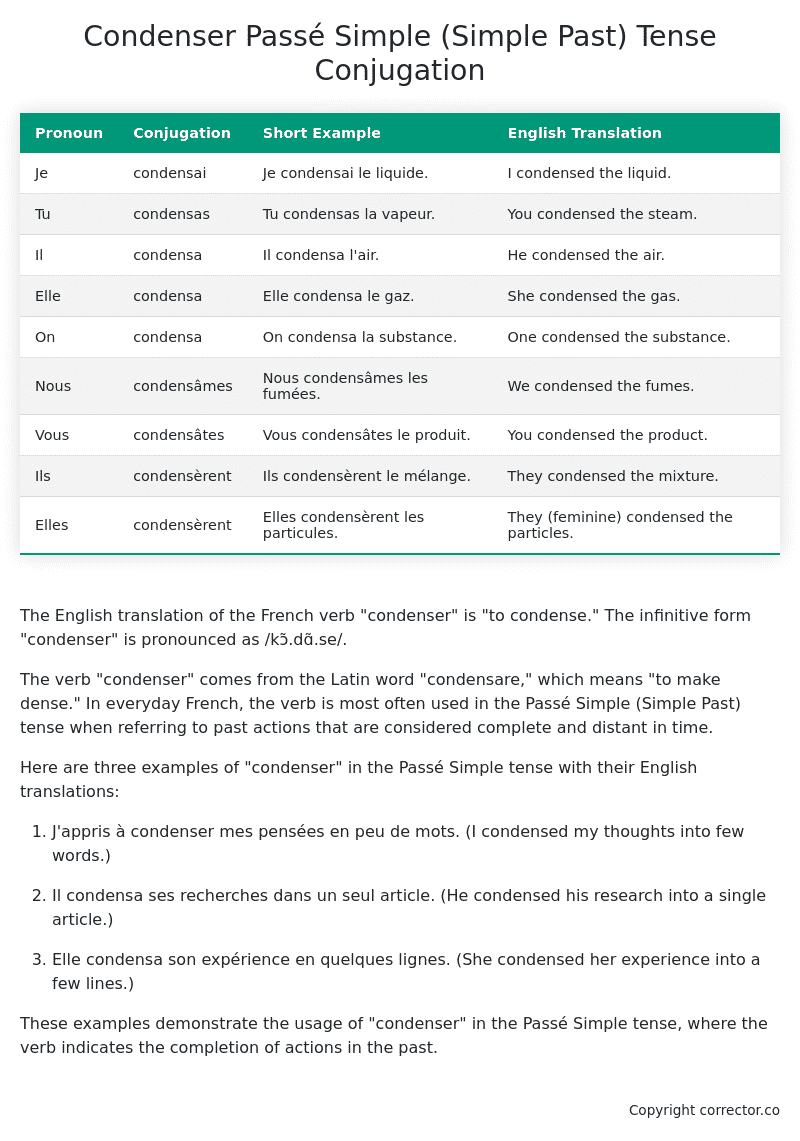Passé Simple (Simple Past) Tense Conjugation of the French Verb condenser
Introduction to the verb condenser
The English translation of the French verb “condenser” is “to condense.” The infinitive form “condenser” is pronounced as /kɔ̃.dɑ̃.se/.
The verb “condenser” comes from the Latin word “condensare,” which means “to make dense.” In everyday French, the verb is most often used in the Passé Simple (Simple Past) tense when referring to past actions that are considered complete and distant in time.
Here are three examples of “condenser” in the Passé Simple tense with their English translations:
-
J’appris à condenser mes pensées en peu de mots.
(I condensed my thoughts into few words.) -
Il condensa ses recherches dans un seul article.
(He condensed his research into a single article.) -
Elle condensa son expérience en quelques lignes.
(She condensed her experience into a few lines.)
These examples demonstrate the usage of “condenser” in the Passé Simple tense, where the verb indicates the completion of actions in the past.
Table of the Passé Simple (Simple Past) Tense Conjugation of condenser
| Pronoun | Conjugation | Short Example | English Translation |
|---|---|---|---|
| Je | condensai | Je condensai le liquide. | I condensed the liquid. |
| Tu | condensas | Tu condensas la vapeur. | You condensed the steam. |
| Il | condensa | Il condensa l’air. | He condensed the air. |
| Elle | condensa | Elle condensa le gaz. | She condensed the gas. |
| On | condensa | On condensa la substance. | One condensed the substance. |
| Nous | condensâmes | Nous condensâmes les fumées. | We condensed the fumes. |
| Vous | condensâtes | Vous condensâtes le produit. | You condensed the product. |
| Ils | condensèrent | Ils condensèrent le mélange. | They condensed the mixture. |
| Elles | condensèrent | Elles condensèrent les particules. | They (feminine) condensed the particles. |
Other Conjugations for Condenser.
Le Present (Present Tense) Conjugation of the French Verb condenser
Imparfait (Imperfect) Tense Conjugation of the French Verb condenser
Passé Simple (Simple Past) Tense Conjugation of the French Verb condenser (You’re reading it right now!)
Passé Composé (Present Perfect) Tense Conjugation of the French Verb condenser
Futur Simple (Simple Future) Tense Conjugation of the French Verb condenser
Futur Proche (Near Future) Tense Conjugation of the French Verb condenser
Plus-que-parfait (Pluperfect) Tense Conjugation of the French Verb condenser
Passé Antérieur (Past Anterior) Tense Conjugation of the French Verb condenser
Futur Antérieur (Future Anterior) Tense Conjugation of the French Verb condenser
Subjonctif Présent (Subjunctive Present) Tense Conjugation of the French Verb condenser
Subjonctif Passé (Subjunctive Past) Tense Conjugation of the French Verb condenser
Subjonctif Imparfait (Subjunctive Imperfect) Tense Conjugation of the French Verb condenser
Subjonctif Plus-que-parfait (Subjunctive Pluperfect) Tense Conjugation of the French Verb condenser
Conditionnel Présent (Conditional Present) Tense Conjugation of the French Verb condenser
Conditionnel Passé (Conditional Past) Tense Conjugation of the French Verb condenser
Conditionnel Passé II (Conditional Past II) Tense Conjugation of the French Verb condenser
L’impératif Présent (Imperative Present) Tense Conjugation of the French Verb condenser
L’impératif Passé (Imperative Past) Tense Conjugation of the French Verb condenser
L’infinitif Présent (Infinitive Present) Tense Conjugation of the French Verb condenser
L’infinitif Passé (Infinitive Past) Tense Conjugation of the French Verb condenser
Le Participe Présent (Present Participle) Tense Conjugation of the French Verb condenser
Le Participe Passé (Past Participle) Tense Conjugation of the French Verb condenser
Struggling with French verbs or the language in general? Why not use our free French Grammar Checker – no registration required!
Get a FREE Download Study Sheet of this Conjugation 🔥
Simply right click the image below, click “save image” and get your free reference for the condenser Passé Simple tense conjugation!

Condenser – About the French Passé Simple (Simple Past) Tense
Formation
Usage
Narration
Historical Context
Interactions with other tenses
Passé Composé
Imparfait
Conditional and Subjunctive
Summary
I hope you enjoyed this article on the verb condenser. Still in a learning mood? Check out another TOTALLY random French verb conjugation!


